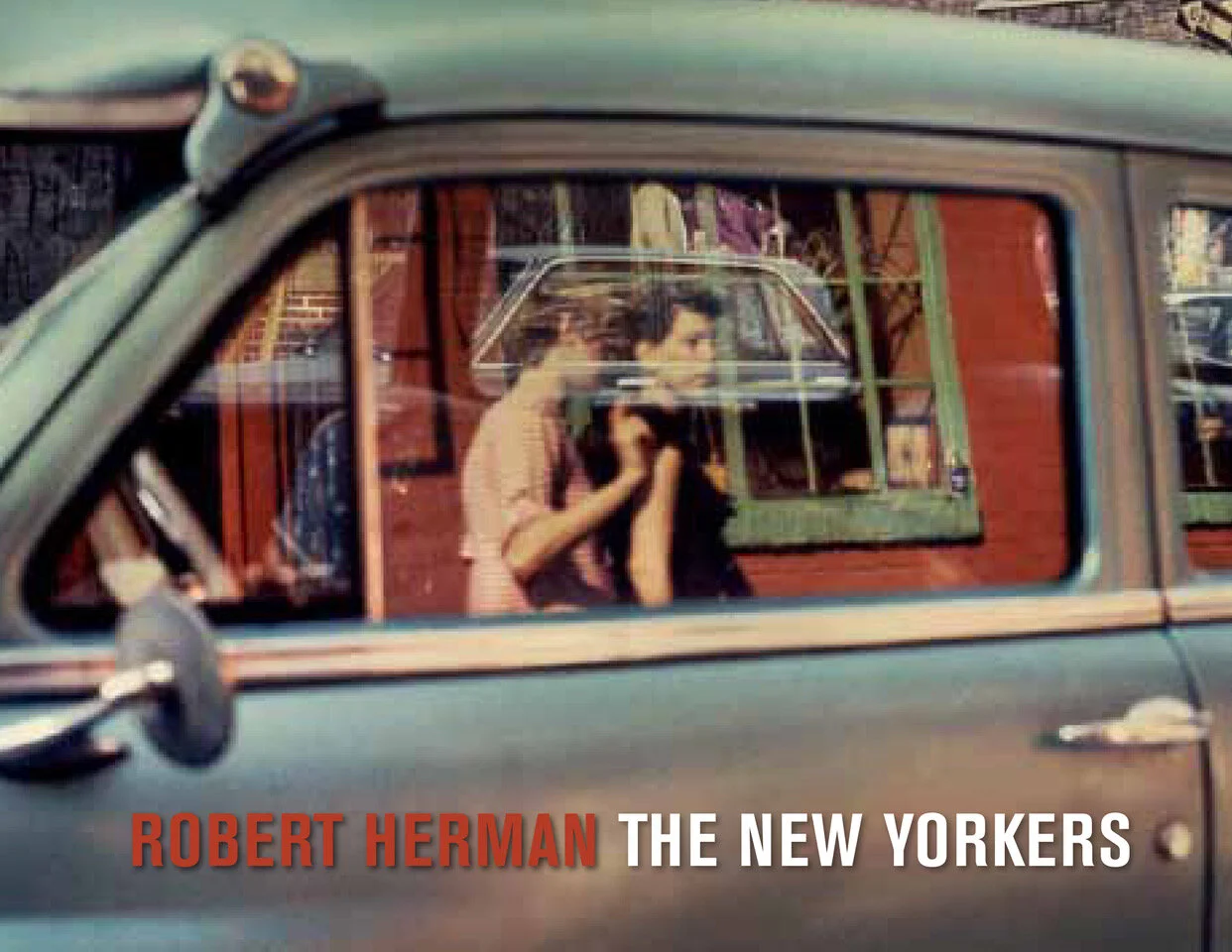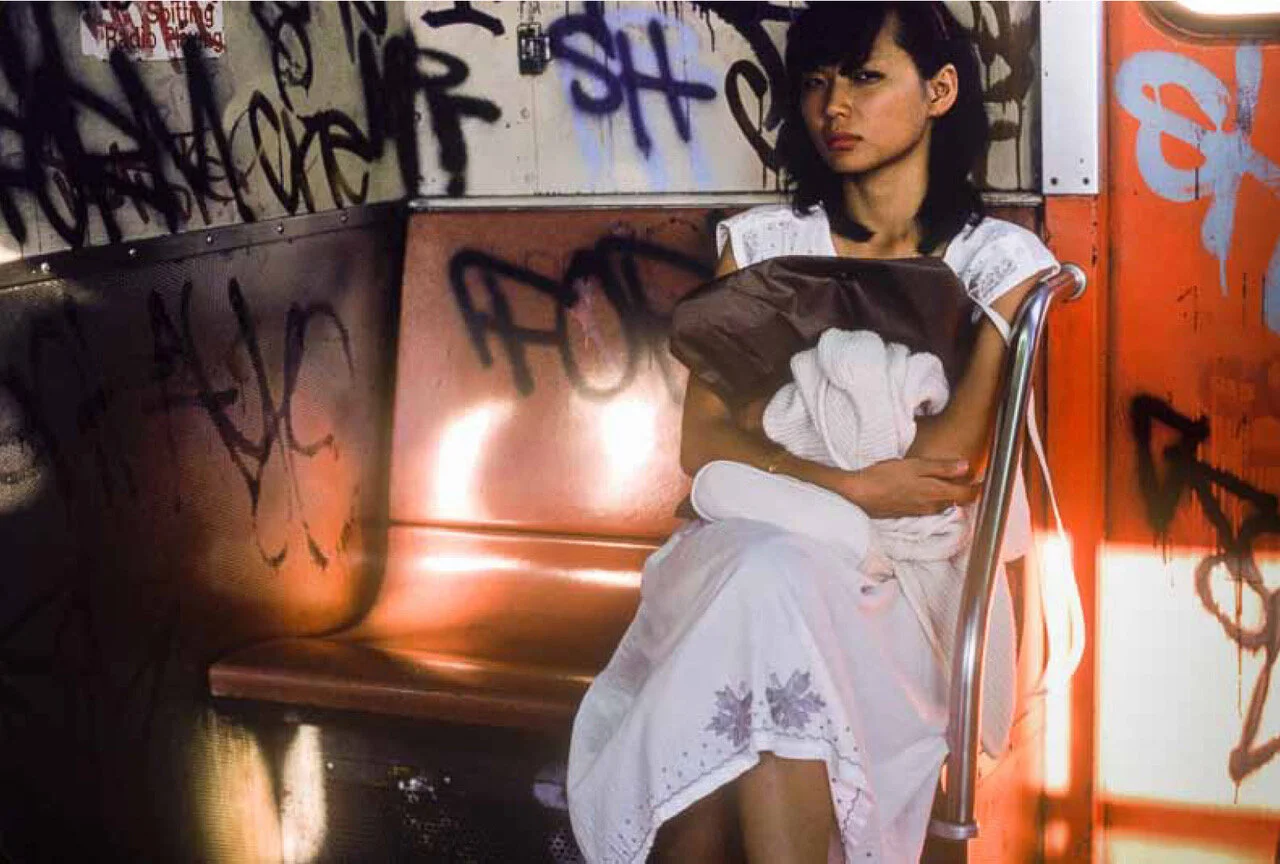Remembering Robert Herman
8/24/1955 – 3/20/2020
Robert Herman At Dish Restaurant in Chelsea, NYC. Photo by Daryl-Ann Saunders
Robert attended many photo events and was extremely conscientious about attending opening receptions to show support of his colleagues. With other photo friends, we frequented Dish Restaurant in nearby Chelsea afterward for it's big booths, reasonable prices and strong coffee. — Daryl-Ann Saunders
Robert Herman, a renowned street photographer who lived and worked in New York, died on Friday, March 20th, 2020. He was the author of two monographs: The New Yorkers (Proof Positive Press) was a collection of his New York City photographs shot on Kodachrome between 1978-2005; his second monograph, The Phone Book (Schiffer Books 2015), was Herman’s collection of iPhone photographs made using the Hipstamatic App’s square format while traveling across the world. The Phone Book was chosen as one of the best photography books of 2015 by Elizabeth Avedon.
Herman’s photographs are in the permanent collections of The Museum of the City of New York, The George Eastman House, The Telfair Museum in Savannah GA and the Mario Franco Archives/Casa Morra Foundation in Naples, Italy. His work has been featured in The New York Times, Lens Culture and many other publications.
Arcade Project has compiled four tributes to Herman’s life, work, and legacy:
Ruben Natal-San Miguel
Robert Herman at The Market Diner, NYC. (l to r: Robert Herman, Roberta Fuorvia, Ruben Natal-San Miguel, Daryl-Ann Saunders, Luis Carle). Photo by Daryl-Ann Saunders.
Robert loved being a part of the photo community. We gathered with a group of friends to attend the annual benefit at Aperture. Afterward we piled into The Market Diner, a place he particularly enjoyed as the architecture harkened back to to the 1960s. To our dismay, we found out it was closing the following week after 51 years of service. So our time there turned out to be a coincidental goodbye to an icon of New York. — Daryl-Ann Saunders
Robert always felt like he was never good enough. He worked, just like me, around the clock: he hustled, he strived. He was also dismissed and rejected by many because the photo industry likes to create a superstar out of nothing, the younger the better: the most prestigious college attended, the greater pedigree to pump out into the gallery scene and the market.
Robert worked very hard for over forty years, but many institutions and photo non-profits simply ignored him and his work, trying to give the chance to young, inexperienced ''flash in the pan'' types. Photography requires expertise, knowledge and a career based on a strong build-up. He had to self-publish his own book to prove himself! Thank you, Sean Corcoran, for giving him (and many of us) an opportunity with Collecting New York’s Stories: Stuyvesant to Sid Vicious at the Museum of the City of New York. You gave him extreme happiness. Robert was the happiest man in that room and that is how wish to remember him.
I am heartbroken. My life in so many ways mirrors his: a single photographer living his dream alone in NYC. The saddest thing is that Robert was, up to the last minute of his life, trying to seek approval and recognition but he had already made it: the industry was what denied his real glory. Bless you Robert. I feel you.
Robert Herman, The Misfits, New York City, 1981. On view at Collecting New York’s Stories: Stuyvesant to Sid Vicious at the Museum of the City of New York.
Patricia Fabricant
Cover of Robert Herman’s monograph The New Yorkers. Image courtesy of Patricia Fabricant.
I designed Robert Herman’s book The New Yorkers which came out in 2013. The subject was near and dear to me; a New Yorker myself, I felt that Robert had captured the city at a dark yet exciting moment and in a unique, personal, and nonetheless accurate way. He was a transplant, but he “got” my city and its inhabitants. I loved working with his photos. Working with Robert, the man, posed unique challenges. He had been quite open about being bipolar (and reading that in his afterword helped me understand), and he was unquestionably in a manic phase during the design process. Working with artists is always delicate — their work is so personal and my job as a designer is to do it justice — but that was compounded by his mental state at the time. He would revise and revise and undo and redo until I thought I would lose my own mind. He worked all night long—I would wake up to emails sent at 2am, 3am. But it was all in the service of making the best book possible. And we did; we really did.
When the book was done I think we were both exhausted. I felt like I had delivered his baby. The labor had to be induced because he really did not want to let it go. But, in the end, we exited the process with tremendous mutual affection and respect for one another. Over subsequent years whenever our paths crossed we would have a lively conversation or share a verboten cigarette. He referred my skills to other photographers and I heard constantly, and still do, how thrilled he was with the result.
I knew he was troubled. He never hid that he was troubled. I can empathize with what I imagine was the combination of the isolation of quarantine and the loss of the city that nourished him and provided stimulation and solace. I share his connection to this city and it is incomprehensible to be living here yet not LIVING here. Losing that lifeline, even temporarily, was just too much for him to bear. The demons took over. His note, “how do you enjoy life?” may be the saddest thing I have ever read.
Photograph from The New Yorkers by Robert Herman. Image courtesy of Patricia Fabricant.
Self-portrait from The New Yorkers by Robert Herman. Image courtesy of Patricia Fabricant.
Jaime Permuth
Robert Herman was a New Yorker through and through: sophisticated, combative, opinionated, a man of irrepressible wit and the deepest passion for photography. He was unapologetic, eccentric and talented. I loved him for all of those reasons.
We met as students in the Masters in Digital Photography program at SVA - two of the older people in the program - and we really connected. Robert liked to roll his own tobacco and always looked for an outside table where he could smoke and enjoy a quiet conversation. It was a pleasure to sit at that table with him.
It is not easy to be an artist in a society that is so deeply skeptical about the work we do, so tight-fisted and begrudging with its support and appreciation.
What a shame that is.
Robert, I hope you knew how much your photographs do matter; your legacy endures in them and lives on in our hearts.
Robert Herman, Hye-Ryoung Min and LaNola Stone at John Jay College Art Gallery, NYC, 2011. Image courtesy of Jaime Permuth.
Daryl-Ann Saunders
Robert Herman at Adorama, NYC. Photo by Daryl-Ann Saunders.
Robert successfully funded his first monograph, the highly acclaimed The New Yorkers, through a Kickstarter campaign. As a dedicated educator, he taught street photography workshops throughout the U.S., Italy and other countries. This seminar at Adorama in NYC describes his Kickstarter experience in detail, from conception to realization. It is available for viewing on Adorama’s YouTube channel. — Daryl-Ann Saunders
We all have various forms of challenge and suffering in our lives. Robert Herman struggled with bipolar disorder and bouts of depression. He was forthcoming about it, referencing it in the forward of his first monograph, The New Yorkers. I mention this because it was a powerful component of his reality but, that said, he was diligent in not allowing it to define him as a professional photographer or as a visual artist. He was smart, kind, generous with his knowledge, and supremely dedicated to his photographic work as a street photographer: for him, it was his life's journey. He could also be difficult, irascible and truthful to the point of blunt discomfort. Like many of us, he was a complex individual. So, when someone takes their own life, many have a theory about why. For now, I will simply say that he was a close friend. And I ask, if you are struggling with overwhelming depression or just coping in general, that you please seek assistance immediately — don’t withdraw or isolate yourself; there are many online resources available that can direct you to avenues of help.
Photographs form a timeline… a travelogue of our lives and our connection points with others. These photos speak to a number of Robert’s favorite things to do — he taught street photography workshops, edited and presented his work in book and exhibition form, stayed connected with the photo community, and was supportive of his colleagues and friends.
Robert Herman with Hipstamatic VP of Special Projects, Mario Estrada at the Apple Store, NYC. Photo by Daryl-Ann Saunders.
Sponsored by Schiffer Books and ASMP-NY, the book launch and artist talk for Robert Herman’s second monograph, The Phone Book” took place at The Apple Store, NYC. Having it at this location was a coup because one of the book’s compelling images is of the shifting reflections of the store's staircase. (This book contains only his iPhoneography work, created with the Hipstamatic app on his iPhone.) — Daryl-Ann Saunders









